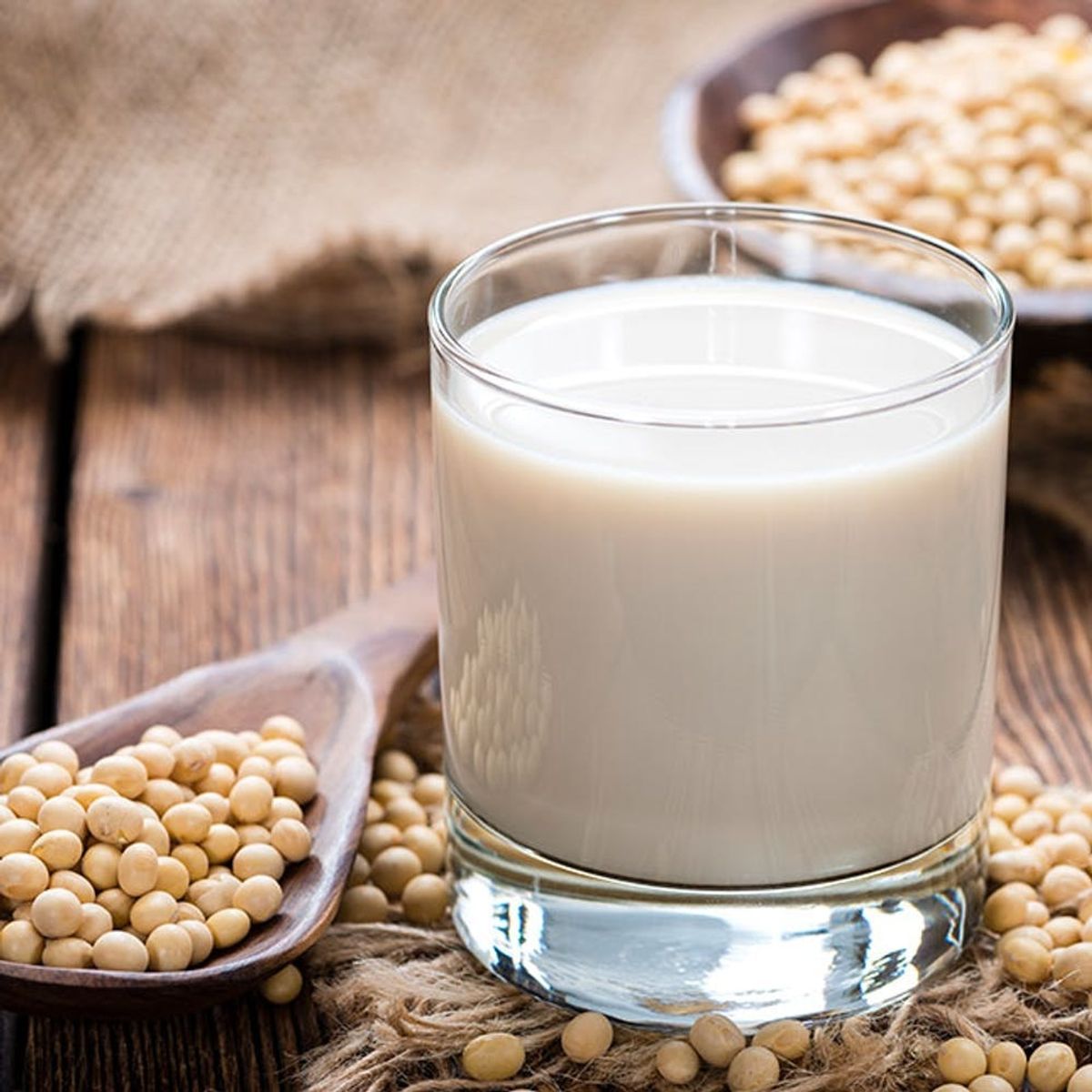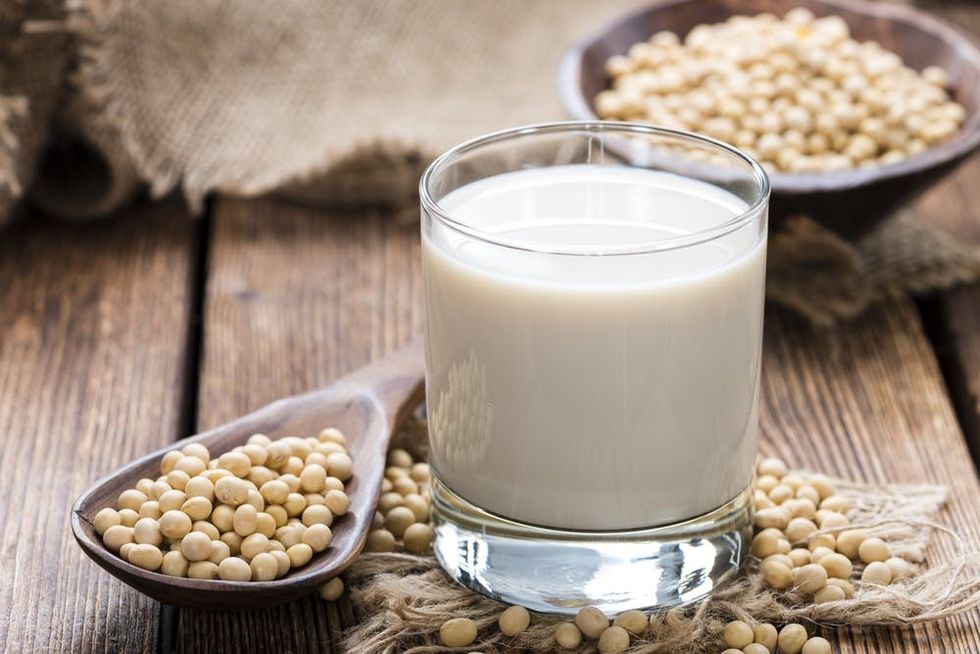Here’s what you need to know.
This Is the Milk Alternative With the Most Protein

It’s hard to dunk your favorite cookies without a glass of milk. And who wants to eat dry cereal? But if you can’t have dairy because of lactose intolerance, allergies, or other reasons, then you may be longing for this popular beverage. Fortunately, there are other delicious options like soy milk, and a new study claims that it’s almost as nutritionally healthy as what you get from a cow and possibly better than other alternatives to dairy. However, soy isn’t free from controversy, and some believe that the phytoestrogens in it may be harmful. We talked to two nutrition experts to weigh the pros and cons.

The Research
Wondering which dairy alternative is best? In a recent study published in the Journal of Food Science Technology, researchers focused on the nutritional value of soy, almond, coconut, and rice milks. A comparison of these plant-based beverages revealed that soy had more nutrients than the others did. Also, when you put soy and cow’s milk side by side, they have almost the same amount of protein, but soy has fewer calories and less fat.
Here’s how the numbers break down in the study:
- Cow’s milk has 158 calories, 9.05 grams of fats, 8.11 grams of proteins, 11.5 grams of carbohydrates, and 294.2 mg of calcium
- Soy milk has 95 calories, 4.5 grams of fats, 8 grams of proteins, 4 grams of carbohydrates, and 330 mg of calcium
- Rice milk has 130 calories, 2.5 grams of fats, 1 gram of proteins, 26 grams of carbohydrates, and 315 mg of calcium
- Coconut milk has 45 calories, 4.25 grams of fats, 0 grams of proteins, 1 gram of carbohydrates, and 220 mg of calcium
- Almond milk has 35 calories, 2.5 grams of fats, 1 gram of proteins, 1 gram of carbohydrates, and 330 mg of calcium
The bottom line? If you can’t drink cow’s milk, but still want a lot of protein and calcium, then soy milk is the best option compared to the other plant-based beverages on this list. None of them come close to the protein content in soy.
The Benefits
And there are more reasons to fill your cart with soy milk the next time you’re shopping. Registered dietitian Holly Pudwill shares that it doesn’t have cholesterol and is a good source of isoflavones, which are plant-derived compounds with health benefits. Soy contains unsaturated fatty acids, fiber, iron, zinc, and B vitamins, and its oligosaccharides, which are carbohydrates, potentially function as a prebiotic. Your gut loves prebiotics because they help beneficial bacteria grow.
“Of all the plant protein sources, soy is the only one that has high-quality proteins, which provide essential amino acids in a proportion best suited to your body’s needs. However, this amino acid profile is not consistent across all soy-based products, as alterations occur during processing,” Pudwill says. This means that you can’t assume every carton of soy milk has the same amount of protein. The manufacturing process can affect how many proteins end up in your milk and other products, so it’s important to always read the labels.
Sandra Arevalo, RDN and spokesperson for the Academy of Nutrition and Dietetics, explains that soy milk may be a good option for people who are managing their weight since its caloric content is lower than dairy. According to Arevalo, the benefits don’t end there. “Soy may [help] prevent cancer due to the high content of antioxidants and treat anemia as it contains six to eight percent of the recommended daily values of iron. It may also improve postmenopausal symptoms,” she adds.
But what about the other plant-based drinks like almond, coconut, and rice milks? The experts share that both almond and coconut milks have low calories but not enough proteins. Rice milk seems to be the worst option because it’s high in calories and carbs with little protein.
The Concerns
Despite the recent study, not everyone is reaching for a cold glass of soy milk because of some concerns. First, there’s the worry about phytoestrogens in this plant-based beverage affecting fertility and hormone levels. These natural compounds have properties similar to estrogen hormones. Arevalo cautions that the research on this issue is still inconclusive: “There are many different types of phytoestrogens, and it’s still unclear which type helps with what.”
Pudwill agrees and points out that the phytoestrogens in soy such as isoflavones and lignans have actually been found to have health benefits like being associated with a decreased risk of breast and prostate cancers. In addition, they may provide some protection against chronic diseases.
But there’s one concern about soy milk you shouldn’t ignore. Arevalo warns that if the soy milk you’re drinking isn’t fortified, your bones can pay the consequences, since this plant doesn’t naturally have the calcium and vitamin D that cow’s milk has. Fortunately, it’s not hard to find fortified versions in a store — just read the product labels.
Of course, if you have soy allergies, you have to avoid this type of milk. The experts caution against thinking you can just replace it with almond or rice milk. The nutritional profiles are different, so you have to make sure you’re getting enough calcium, proteins, and more nutrients from other sources in your diet.
Both experts agree that the benefits of soy outweigh the concerns, especially for people who can’t tolerate cow’s milk. So if you can’t have dairy, you don’t need to suffer with dry cereal. Grab a carton of soy milk and enjoy.
Tell us what you think about soy milk on Twitter @BritandCo.
(Photo via Getty)



















